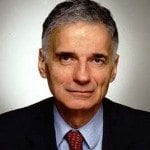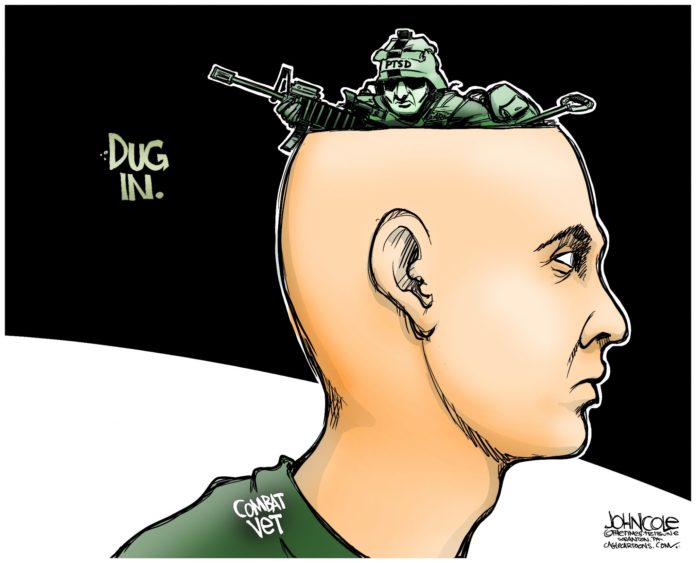BY RALPH NADER
 “I am sorry that it has come to this.” Thus began the searing suicide note by 30-year-old Iraq War veteran, Daniel Somers on June 10, 2013 to his wife and family.
“I am sorry that it has come to this.” Thus began the searing suicide note by 30-year-old Iraq War veteran, Daniel Somers on June 10, 2013 to his wife and family.
On the other side of the violent divide are video messages from the suicide bombers – the oft-described “weapon of the weak” against U.S. soldiers and their presumed local collaborators.
In 2012 suicide by active duty American soldiers exceeded the number of U.S. combat deaths in Afghanistan. Why?
In the war zones of Iraq and Afghanistan, young natives are lining up to become suicide bombers. Why?
For the soldiers’ conditions, there is an acronym – PTSD or post-traumatic stress syndrome. During World War I, it used to be called “shell-shock.” But in the Afghan and Iraq regions, the adversaries are not modern armies armed with “shells – they have no thunderous artillery, missiles, gunships, tanks fighter planes or drones. They have rifles, rocket-propelled grenades, Improvised Explosive Devices [IEDs] and suicide belts sporadically used. Something else is at work that is causing PTSD.
War correspondent and author, Kevin Sites offers this explanation: “Our understanding of PTSD from a clinical perspective has been that it’s triggered by witnessing a traumatic event that resonates so deeply that it prevents a person from leading a normal life in the aftermath. And so it is the witnessing of the event that causes the problems … The Veterans Administration [VA] started looking at the connection between killing and post-traumatic stress and found that those soldiers who were involved in killings or who witnessed killings were experiencing a higher degree of post-traumatic stress disorder … it was about the feelings of guilt they had about what they did or witnessed. And the guilt stemmed from two things: the guilt from killing, whether justified in the line of duty or killing a civilian by accident or killing one of your own guys by accident or killing in a war crime – so any kind of killing; the second point was surviving, survivor’s guilt. Their friends died, but they didn’t.”
The VA distilled thousands of interviews in their 2009 report, Moral Injury in the Context of War, to come to their assessment.
Mr. Sites came to the same judgment after his many profiles of returning veterans. In an interview with the Northwestern Alumni Magazine, he said “when we do something that goes against our moral compass – and killing goes against a lot of moral compasses out there – unless you’re a sociopath – we do feel some empathy … So that idea of participation in something that goes against your moral compass really screws you up. It makes you feel bad, makes you feel guilt and shame.”
But soldiers aren’t supposed to talk about these feelings and don’t, which is why Sites titled his new book The Things They Cannot Say: Stories Soldiers Won’t Tell You About What They’ve Seen, Done or Failed to Do in War [Harper Perennial].
The fact that the wars in Iraq and Afghanistan were so one-sided in weaponry and so full of casualties of innocent civilians, including children, who never threatened our country, exacerbates these feelings of guilt.
This trauma coursed through the lengthy suicide letter of Daniel Somers who ran more than 400 combat missions as a machine gunner in Iraq during 2004-05 and later worked with JSOC – Joint Special Operations Command – in Mosul, Iraq.
He writes “to sleep forever seems to be the most merciful thing … During my first deployment, I was made to participate in things, the enormity of which is hard to describe. War crimes, crimes against humanity. Though I did not participate willingly, and made what I thought was my best effort to stop these events, there are some things that a person simply cannot come back from … To force me to do these things and then participate in the ensuing cover-up is more than any government has the right to demand.”
In Daniel Somers’ final message he asks: “And for what? Bush’s religious lunacy? Cheney’s ever growing fortune and that of his corporate friends? Is this what we destroy lives for?”
As for what he called his “actual final mission,” he wrote: “Not suicide, but a mercy killing … It was quick, and I did not suffer. And above all, now I am free … I have no more nightmares or flashbacks or hallucinations.”
What of the young suicide bombers who are depicted in their videos as wanting to become martyrs? Western reporters like to say their motivation is to go the Islamic paradise. That is not what University of Chicago professor, Robert Pape found in his extensive research, concluding that their principal motivation was to expel the occupying invader.
Their immense poverty, war-torn devastation of their villages and tribal areas, and the absence of any future, whether of economic survival or personal achievements, was probably also in the mix. Perhaps some money was given to their destitute families in exchange for their attacks.
Whatever the reasons, to dismiss these fighters as sociopaths is to help preclude our own examination of why we are there blowing apart their societies, provoking sectarian revenge cycles, bribing our way everywhere with crates of $100 bills.
As a Yemeni villager plaintively asked, after a devastating drone attack that killed many civilians, “why do you hate us so much?”
Here in the U.S. we better start understanding the rising tide of suicides generally. The Centers for Disease Control totals suicides in 2010 at 38,364 Americans as compared with homicides totaling 16,259. Among the baby boomers, suicides are sharply higher than previous generations, especially since the onset of the recession, unemployment and home foreclosures.
We better starting digging more deeply into the conditioning “whys?” and discounting the traditional explanations of self-hatred and hating us “for our freedoms.”
Nader.org








